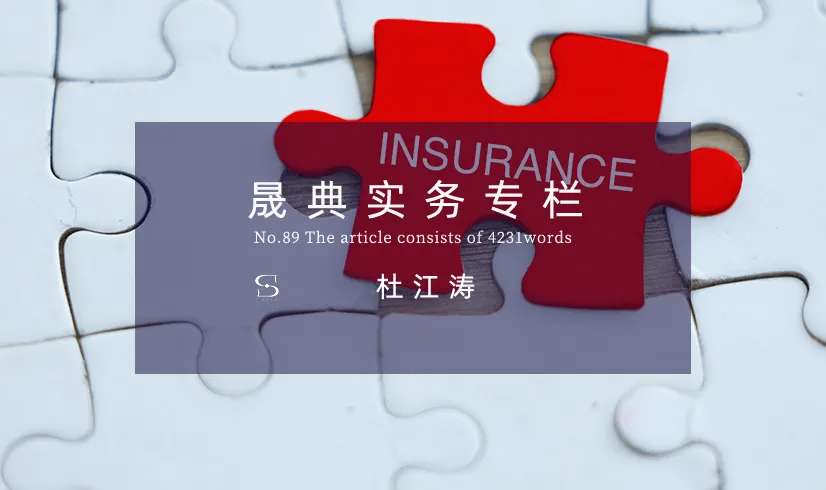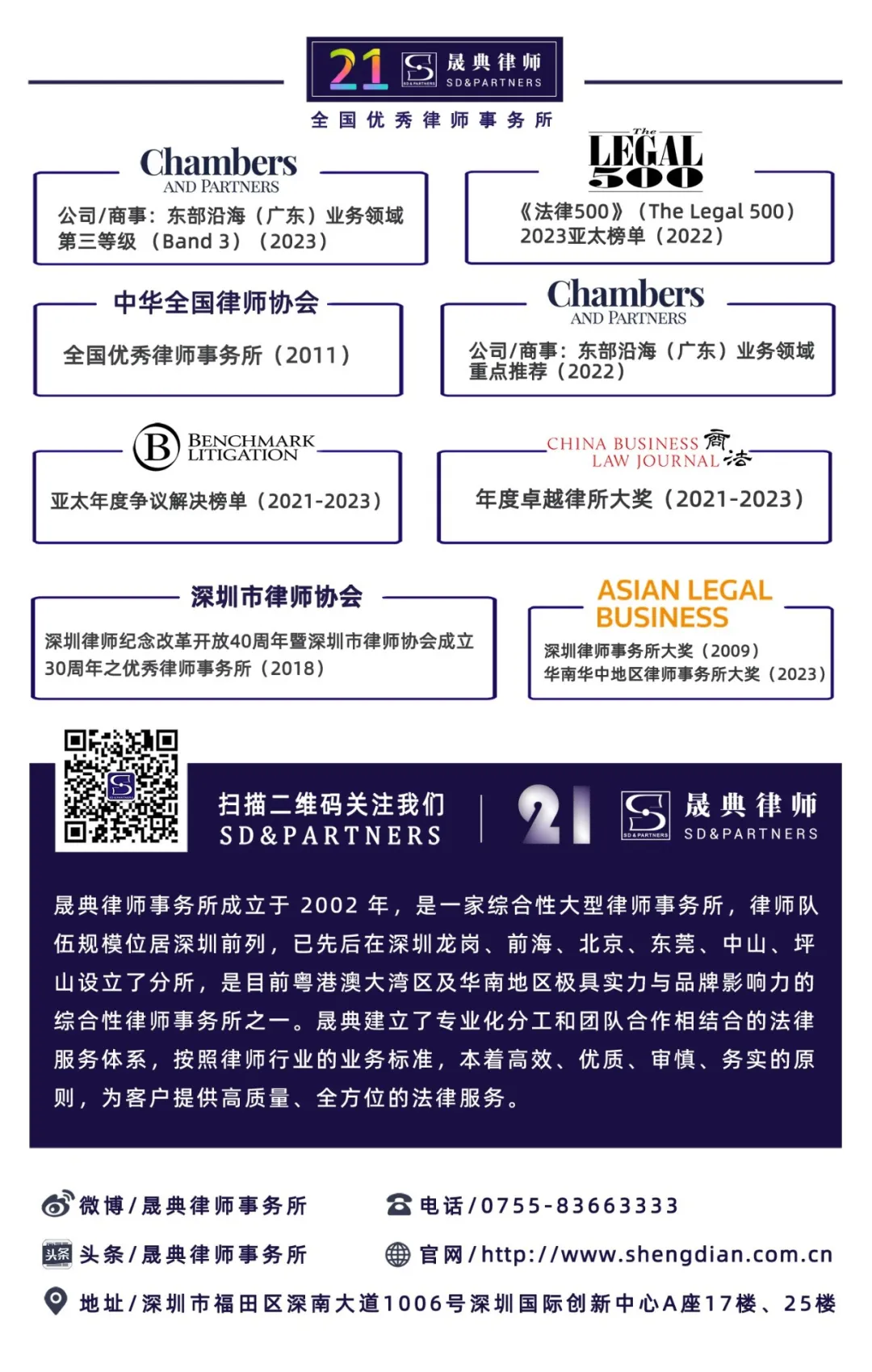Shengdian Practice | Du Jiangtao: Exploring the Safety and Security Obligations of Place Operators (Managers)
![]() Loading...
Loading...
![]() 2023.12.15
2023.12.15

According to Article 1,198 of the the People's Republic of China Civil Code (hereinafter referred to as the Civil Code), the obligation to ensure safety refers to the obligation of operators, managers or organizers of mass activities of business premises, public places to take certain behavioral measures within reasonable limits to protect the personal and property safety of others from infringement. With the development of economy, the interaction between individuals has increased in recent years, and the disputes of place operators (managers) violating the obligation of safety and security are also increasing.
The author combines personal case handling experience and practical experience to try to integrate and explore the relevant issues.
As the subject of individual participation in social interaction, each interaction will open the duty of care for the safety of the object of communication, which is the source of the concept of security obligation [note I]. According to the general theory of scholars, the theory of China's security obligation comes from the theory of "communication security obligation" in German case law and the theory of "duty of care" in common law system. [note ii] on the basis of absorbing foreign laws and combining with the judicial practice of our country, the supreme people's court issued the "interpretation of the supreme people's court on several issues concerning the application of law in the trial of personal injury compensation cases" (hereinafter referred to as the "judicial interpretation of personal injury") in 2003. the first paragraph of article 6 stipulates that "natural persons, legal persons and other organizations engaged in accommodation, catering, entertainment and other business activities or other social activities, the people's court shall support the request of the right holder of compensation for personal injury caused by the failure to fulfill the safety guarantee obligation within the reasonable limit." This interpretation formally establishes the system of security obligations in our country, and thus establishes the specific connotation of the obligation.
Subsequently, under the impetus of judicial practice and theoretical research, Article 37 of the the People's Republic of China Tort Liability Law (hereinafter referred to as the Tort Liability Law), which came into effect in July 2010, formally raised the obligation of safety and security to the legislative level, and legalized the obligation of safety and security in the form of law. On the basis of the original judicial interpretation, the legislative description of the subject of responsibility has been changed to "the manager of hotels, shopping malls, banks, stations, entertainment places and other public places or the organizer of mass activities", and the requirement of "reasonable limit range" has been deleted, and it is stipulated that "if the third party causes damage to others due to the behavior of the third party, the third party shall bear the tort liability; If the manager or organizer fails to fulfill the obligation of safety guarantee, bear the corresponding supplementary responsibility."
After more than ten years of development, Article 1,198 of the Civil Code, which came into force in 2021, further expanded the subject of responsibility for safety and security obligations on the basis of the Tort Liability Law, combined with judicial practice and scholars' theories. "Operators, managers or organizers of mass activities in hotels, shopping malls, banks, stations, airports, stadiums, entertainment venues and other business places and public places, those who fail to fulfill their security obligations and cause damage to others shall bear tort liability", and stipulate that "after the operator, manager or organizer assumes supplementary liability, they may recover compensation from a third party."
With the implementation of the "Civil Code", the "Judicial Interpretation of Personal Injury" was revised to delete the original article 6, and the "Tort Liability Law" was also abolished. In addition to Article 1,198 of the Civil Code, in the current legal system, safety protection obligations are also scattered in the the People's Republic of China Consumer Rights Protection Law, Railway Law, Highway Law, Civil Aviation Law, Fire Protection Law, and the Regulations on the Administration of Entertainment Places, the Regulations on the Administration of Commercial Performances, etc., which together with the Civil Code constitute the legal source of my country's safety protection obligations.
2. The content of the security obligation.
At present, the legal provisions on the obligation of safety and security in our country are only 1,198 articles of the Civil Code and the provisions scattered in the above-mentioned laws. Up to now, the Supreme People's Court has not issued a judicial interpretation to clearly describe the actual connotation of the obligation of safety and security. Therefore, the connotation of the obligation of safety and security can only be summarized from the views of scholars and effective judgments.
From the perspective of scholars and effective judgments, it can be seen that the core connotation of the safety guarantee obligation refers to the subject who has the safety guarantee obligation. Before, during and after the accident, they must take certain actions to protect the person or property of others from infringement. It mainly includes three aspects: 1. The obligation to prevent danger in advance; 2. The obligation to eliminate danger in the event; 3. The obligation to rescue after damage occurs. The sources of this obligation are both statutory sources such as the Civil Code, the Consumer Rights Protection Act, and the Railway Law, as well as sources of contractual obligations arising from contracts of sale between consumers and merchants. [note iii]
Although the "Civil Code" excludes the "reasonable limit range" in Article 6 of the "Judicial Interpretation of Personal Injury", the current judicial practice does not expand the scope of the security obligation indefinitely, and the "reasonable limit range" is basically still The necessary consideration for judging whether the security obligor violates the security obligation. Therefore, it is particularly important to clarify the reasonable limits of security obligations in dealing with such cases.
In determining the reasonable limits of security obligations, the first consideration is the differences of individual cases. Even in the same place, due to the different circumstances and time, the violation of the obligation of safety and security may lead to different legal consequences. Too rigid application of uniform standards may lead to errors in legal and factual determinations. For example, general hospitals and mental Junior College hospitals in patients with suicide risk prevention obligations will be significantly different. Similarly, in a park, there are also significant differences in the identification of the park's security obligations in disputes over damage caused by the failure of amusement facilities during the opening hours of the park and after the park is closed. In general, places that are relatively closed or under the control of managers should bear a higher responsibility for safety and security.
Secondly, in determining the scope of reasonable limits, we must consider the moderation of rights and obligations, and determine the reasonable limits of security obligations according to the benefits obtained by different subjects of obligations. According to the principle that risk is proportional to return, the lower the return, the lower the security obligation of the subject, while the subject with higher income has higher requirements for its security obligation. For example, there are differences between ordinary hotels and five-star hotels in terms of reasonable limits of security obligations. Similarly, for business premises and non-business premises, there are differences in the reasonable limits of security obligations in practice. The standard of safety and security obligations for non-business premises is relatively low, and it usually only needs to fulfill the general obligations of warning, prompting and preventing the expansion of damage. On the other hand, based on their profitability, transactional, professionalism, security capacity and corporate social responsibility, the law gives them higher security obligations.
Thirdly, value orientation needs to be considered when determining the reasonable limit range. The judgment of the obligation of safety and security is not only a process of judicial organs to resolve individual disputes, but also a process of warning and education to the parties and the society. A good referee should correctly consider its value orientation. In the dispute of security obligation, although the main reason is that the security obligor fails to perform the security obligation within a reasonable limit, the society should be taught to realize that everyone is the primary person responsible for their own security. Therefore, in some cases, if the injured person fails to perform the duty of reasonable care, the responsibility of the subject of the obligation of safety and security may be reduced accordingly. In addition, when considering the value orientation, we should also pay special attention to the special protection of children, the disabled, the elderly and other special civil subjects, so as to highlight the social values of caring for vulnerable groups. For example, managers of activity venues specially designed for minors should bear higher security obligations than those of adult activity venues.
Finally, economic efficiency also needs to be considered when determining reasonable limits. The pursuit of fairness is often accompanied by the occurrence of costs. We should not impose too harsh economic burden on the security obligor in order to pursue fairness excessively, otherwise it is not conducive to the prosperity of the economy and the normal development of social activities. Therefore, in determining the criteria for case adjudication, it is necessary to account for the total cost of the accident, taking into account the costs required for the security obligor to set up safety and security facilities, staffing, management systems, hazard disposal, etc. At the same time, the economic, educational and preventive capacity of the injured should be taken into account, and the economic boundary of the security obligation should be demarcated in reverse. The preventive measures that the cost of preventive measures is greater than the probability of accident multiplied by the amount of loss are excluded from the scope of safety and security obligations, with a view to taking into account social efficiency and equity. [note iv]
In addition, in combination with current local judicial precedents, in practice, it is often necessary to consider comprehensively when determining the reasonable limit range of security obligations: the general situation of the security obligor's industry, the specific conditions of the region, the average security standards of the industry, the scale of the activities organized, whether the security obligor complies with mandatory legal provisions, whether to prevent and investigate the risks in public places, the degree of fault of the victim, the cognitive ability of the victim, etc.
In short, when it comes to the reasonable scope of security obligations, we should consider a variety of factors according to the different identities in the case in order to realize our own demands.
At present, there is a dispute about the principle of attribution of disputes over violations of security obligations in judicial practice. The mainstream view is that it is the principle of fault, because the civil law tort liability system of our country lists the cases where the rule of presumption of fault and the rule of no-fault liability are applied, and the cases not listed should be applied to the principle of fault, while the Tort Liability Law and the Civil Code do not have special provisions on the principle of liability for violation of safety and security obligations, so it is believed that the principle of liability for violation should be fault liability, that is, in accordance with the "who claims, who gives evidence" rule, the victim to the administrator, the obligation to prove the existence of fault, the existence of fault is subject to tort liability, otherwise does not bear tort liability. The burden of proof may also shift in the process as the parties prove the facts.
However, there are also views that because the security obligor is in an advantageous position, it is difficult for the victim to obtain evidence, so the principle of presumption of fault should be applied. For example, the article "Summary of Relevant Judgment Rules on Disputes over Liability for Violation of Safety and Security Obligations" of the Judicial Case Research Institute of the Supreme Court holds that the proof of fault for violation of safety and security obligations should be applied to the inversion of the burden of proof. As long as the infringer has committed damage in the place controlled by the security obligor, it can be presumed that the security obligor of the place is at fault. If the security obligor believes that he is not at fault, he shall bear the burden of proof. If it cannot be proved or proved insufficient, the presumption of fault is established and the security obligor constitutes tort liability.
At present, in judicial practice, for disputes over violation of safety and security obligations, the trial is usually carried out according to the principle of fault. However, for disputes over violation of safety and security obligations that occur in business premises with the intervention of a third party, the victim is a person with limited or no capacity for civil conduct, and the requirements for security obligations are higher, the litigant participants can claim to be attributed according to the principle of presumption of fault. [Note v]
Theoretical research needs to fall into real life, from a practical point of view, for dealing with violations of security obligations disputes, the author of the security obligations and victims of the following pre-and post-recommendations:
1. For security obligors:
①For security obligors, they know the actual situation of the whole place best and can foresee the possible dangers and damages best. They should have specific, comprehensive and detailed safety notification obligations, inform in advance of possible risks, ensure that the place is suitable for public passage or activities, and regularly maintain and repair equipment and facilities. Attention should be paid to special groups such as the elderly, children and the disabled. The security obligors of places and activities with minors as the main activity group should fully fulfill the high-standard safety guarantee obligations, and actively perform the obligations of caring for and reminding the guardians of the accompanying minors.
②For ongoing damage, security obligors need to take effective measures to minimize risks, reduce casualties and losses, and leave relevant evidence in the process. At ordinary times, it is necessary to organize plans and exercises for all kinds of emergencies, prepare necessary rescue facilities and equipment, organize emergency rescue skills training for employees, and pay attention to leaving marks. If a third person is involved in the infringement, information such as the identity and address of the third person shall be recorded for future recovery.
③Security obligors should try their best to install necessary safety equipment and monitoring equipment in the places they operate and manage to ensure the personal and property safety of consumers, and provide evidence to reduce their own responsibilities when damage occurs.
④Security obligors can insure commercial insurance according to their own needs, so as to reduce the losses that the infringement may cause to themselves.
2. For victims:
①Follow the instructions of the managers of public places and the organizers of mass activities, abide by the rules of the activities that are told, do not carry out strictly prohibited behaviors, and do not engage in activities that are not suitable for the situation in the venue.
②For their own special health conditions or physical conditions, they should consciously avoid participating in inappropriate group activities; if they insist on participating, they should promptly inform the managers of public places or the organizers of mass activities, and actively cooperate with others after personal or property damage occurs. Rescue or remedial actions carried out by others.
③As soon as the accident occurs, I or my relatives and friends should actively leave certificates at the scene or go to the place of the accident to take photos and videos. For facilities and buildings that may be suspected of violating the national compulsory standards, the shape and size of the facilities and buildings before being damaged can be determined in detail at the scene. After the accident, if conditions permit, the police should report to the police as soon as possible, requesting the police to keep the records of the surveillance cameras near the site of the incident, and keep the contact information of the police on the scene, so as to collect evidence for the later litigation.

- Du Jiangtao Full-time Lawyer-
[Practice background brief]Member of the Civil Tort Professional Committee of the Shenzhen Lawyers Association, Officer of the Futian Law Promotion Work Center of the Futian Law Work Committee, Arbitrator (part-time) of the Shenzhen Luohu District Personnel and Labor Dispute Arbitration Committee, Deputy Director of the Shengdian Civil and Commercial Dispute Resolution Legal Professional Committee. He has a dual education background in computer science and law, a bachelor's degree in engineering and a master's degree in law, and has rich practical experience in dispute resolution. He has handled many difficult and complex civil and commercial cases and achieved good results.
[Main practice field]Civil tort litigation, corporate legal counsel, commercial litigation, finance, securities law, etc.
[Contact Information]
Email: dujiangtao@shengdian.com.cn
Comments:
ⅰSun Ying, "The Construction of Rules for the Judgment of Security Obligations from the Perspective of Legal Interpretation", in Legal Methods, vol. 42, 2023.
ⅱZhou Hongbo and Xie Rui: Judicial Determination of the Reasonable Scope of Security Obligations, in People's Justice (Cases), No. 23, 2022.
ⅲHou Guoyue and Liu Jiuling, "Safety and Security Obligations: Attribute Identification and Responsibility Allocation", Northern Law, No. 1, 2020.
ⅳ Zhan Liang, Shen Ping: "The Limits of the Safety and Security Obligations of Restaurant Operators", People's Justice, No. 35, 2020.
ⅴInstitute of Judicial Cases of the Supreme People's Court: Summary of Judgment Rules on Disputes over Liability for Violation of Safety and Security Obligations.
Editor: Zhu Yiying
Editor: Yan Jiachen
Reviser: Huang Ting/span>


